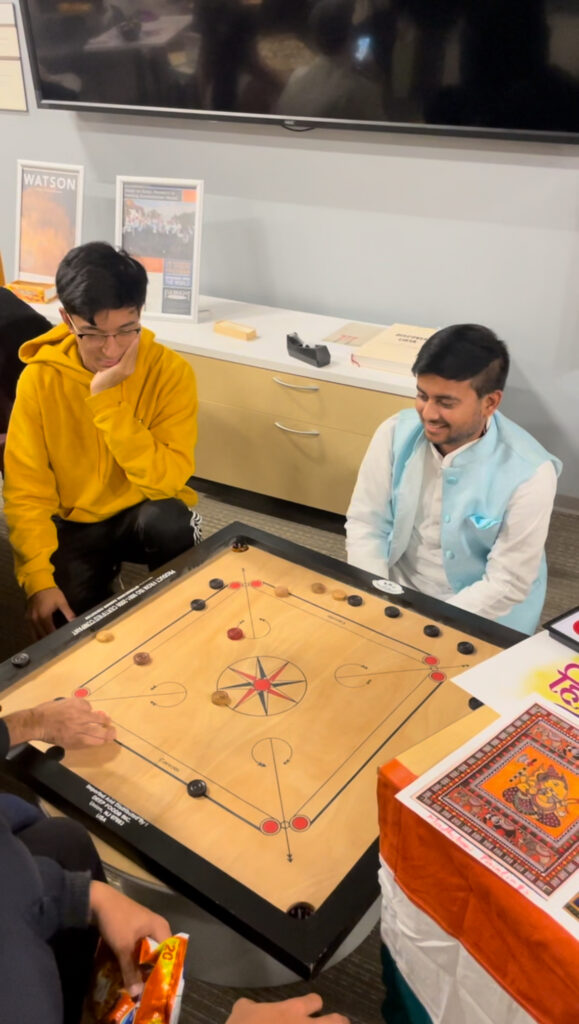by Oleksandra Volakova
The very first event of International Education Week – a week celebrating cultures and languages all around the globe – was organized by representatives from various cultures worldwide. Wesleyan’s Foreign Language Teaching Assistants (FLTAs) collaborated with Fries Center for Global Studies to organize a FLTA Carnival – a festival featuring specific games, stories, food, and traditions. Each table, hosted by a different teaching assistant, was showcasing unique snacks and games from their countries.
The Chinese FLTA, Hongli, welcomed visitors with a game called “Who is the spy?”, where all but one player get the same word, and through asking and answering questions, everyone needs to understand who is the “spy” with a different word. Students also had a chance to try Chinese treats like Black Truffle Lays chips and Ve Wong Little Prince Noodle snacks, which is popular among kids.
The Korean FLTA, Yerim, brought a game called “Gonggi,” where the main goal is to toss and catch five tiny stones. Toss one piece in the air, pick up one or two from the table, and catch the landing one. Later you need to toss two, pick up others, and catch the ones that were thrown again. This game tests coordination and precision, and not everyone could do it in their first attempt.

The next table run by the Italian FLTA, Stefania, was offering deluxe sweets from Italy and invited students to try their luck in a “Tombola” game. It is similar to traditional Bingo, but it has a more complex structure of winners – people can get prizes for getting 3 and more markings in a row, or by achieving other winning combinations. In Italy, Tombola is especially popular among families during holidays like Christmas and New Year, and typically the most popular prize option is money.

Later students could play dominoes or the card game “brisca” with the Spanish FLTAs. The FLTAs are Manuela, who is from Colombia, and Alba and Carlos, who are both from Spain. The rules of the dominoes are widely known – match the ends of the tiles on a table and be the first to run out of all of them. Brisca is also easily understandable – try to get as many high-value cards as possible to have the highest score by the end of the game. While playing, guests got a chance to taste chorizo ibérico – a Spanish pork sausage – and bocadillos de guayaba – a sweet Colombian snack made from dense guava paste.
The Hindi-Urdu FLTA, Aditya, taught attendees how to play a game called “Carrom” – a game where 4 people strike disks “carrommen” with their fingers across a large board. The goal was to get them into small pockets in each of 4 corners, and the winners were rewarded with a spicy kurkure – a popular crunchy snack from India.
Bent Walad, led by the Arabic FLTA Maryem, challenged students to come up with a word in each one of ten categories, all beginning with the same letter. If the word is repeated, the players do not earn points for that category; at the end, the player with the most unique categories wins. She also offered sweet mini-baklava.

The Japanese FLTA, Nao, taught guests how to create small, cute animals and flowers out of a single sheet of paper. This technique is called origami – Japanese art of folding paper without scissors or glue. Those who wanted to test their coordination skills tried themselves in Kendama – a traditional Japanese toy consisting of a wooden handle and a ball connected by a string. The goal is to catch the ball on the special cups on either side or on a spike at the top. Although it sounds easy, only one person out of all the attendees was able to catch the ball on a spike.
The French FLTAs, Marie and Joan, led a game of Mille bornes, a French racing card game where people race to the finish line. After the seated board games, students switched to more active games like another French game named Pétanque hosted by the French FLTAs as well, where players take turns and throw balls to try to get it as close as possible to the target. The person whose ball is the closest to the target wins. French madeleines and butter cookies were available for everyone to enjoy.
If you missed the opportunity to attend the FLTA Carnival this semester, don’t worry – you can experience this exciting cross-cultural event again in the spring semester. Stay tuned for more details from the Fries Center for Global Studies, and enjoy your winter break!



